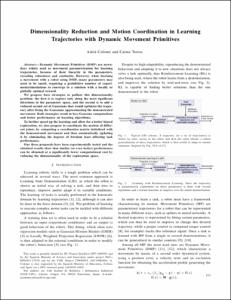Mostra el registre d'ítem simple
Dimensionality reduction and motion coordination in learning trajectories with dynamic movement primitives
| dc.contributor.author | Colomé Figueras, Adrià |
| dc.contributor.author | Torras, Carme |
| dc.contributor.other | Institut de Robòtica i Informàtica Industrial |
| dc.date.accessioned | 2015-10-07T17:08:15Z |
| dc.date.available | 2015-10-07T17:08:15Z |
| dc.date.issued | 2014 |
| dc.identifier.citation | Colomé, A., Torras, C. Dimensionality reduction and motion coordination in learning trajectories with dynamic movement primitives. A: IEEE/RSJ International Conference on Intelligent Robots and Systems. "Intelligent Robots and Systems (IROS 2014), 2014 IEEE/RSJ International Conference on". Chicago: Institute of Electrical and Electronics Engineers (IEEE), 2014, p. 1414-1420. |
| dc.identifier.uri | http://hdl.handle.net/2117/77467 |
| dc.description.abstract | Dynamic Movement Primitives (DMP) are nowadays widely used as movement parametrization for learning trajectories, because of their linearity in the parameters, rescaling robustness and continuity. However, when learning a movement with a robot using DMP, many parameters may need to be tuned, requiring a prohibitive number of experiments/simulations to converge to a solution with a locally or globally optimal reward. We propose here strategies to palliate this dimensionality problem: the first is to explore only along the most significant directions in the parameter space, and the second is to add a reduced second set of Gaussians that would optimize the trajectory after fixing the Gaussians approximating the demonstrated movement. Both strategies result in less Gaussian computations and better performance on learning algorithms. To further speed up the learning and allow for a better biased exploration, we also propose to coordinate the motion of different joints, by computing a coordination matrix initialized with the demonstrated movement and then automatically updating it by eliminating the degrees of freedom least affecting task performance. Our three proposals have been experimentally tested and the obtained results show that similar (or even better) performance can be obtained at a significantly lower computational cost by reducing the dimensionality of the exploration space. |
| dc.format.extent | 7 p. |
| dc.language.iso | eng |
| dc.publisher | Institute of Electrical and Electronics Engineers (IEEE) |
| dc.rights.uri | http://creativecommons.org/licenses/by-nc-nd/3.0/es/ |
| dc.subject | Àrees temàtiques de la UPC::Informàtica::Robòtica |
| dc.subject.other | manipulators |
| dc.subject.other | robot kinematics |
| dc.subject.other | reinforcement learning |
| dc.subject.other | motor primitives |
| dc.subject.other | dimensionality reduction |
| dc.title | Dimensionality reduction and motion coordination in learning trajectories with dynamic movement primitives |
| dc.type | Conference report |
| dc.contributor.group | Universitat Politècnica de Catalunya. ROBiri - Grup de Robòtica de l'IRI |
| dc.identifier.doi | 10.1109/IROS.2014.6942742 |
| dc.description.peerreviewed | Peer Reviewed |
| dc.subject.inspec | Classificació INSPEC::Automation::Robots::Robot kinematics |
| dc.relation.publisherversion | http://ieeexplore.ieee.org/stamp/stamp.jsp?tp=&arnumber=6942742 |
| dc.rights.access | Open Access |
| local.identifier.drac | 15314454 |
| dc.description.version | Postprint (author’s final draft) |
| dc.relation.projectid | info:eu-repo/grantAgreement/EC/FP7/269959/EU/Intelligent observation and execution of Actions and manipulations/INTELLACT |
| local.citation.author | Colomé, A.; Torras, C. |
| local.citation.contributor | IEEE/RSJ International Conference on Intelligent Robots and Systems |
| local.citation.pubplace | Chicago |
| local.citation.publicationName | Intelligent Robots and Systems (IROS 2014), 2014 IEEE/RSJ International Conference on |
| local.citation.startingPage | 1414 |
| local.citation.endingPage | 1420 |


